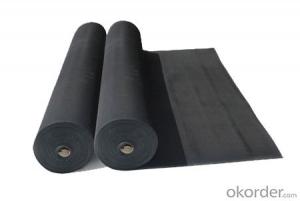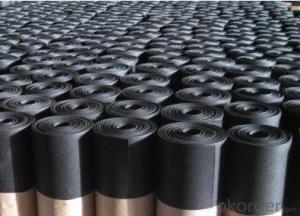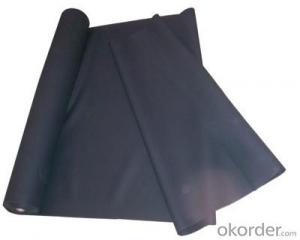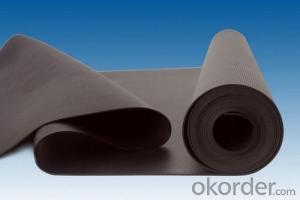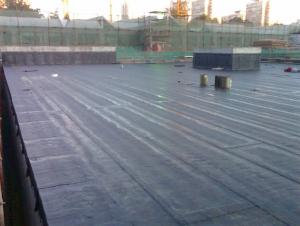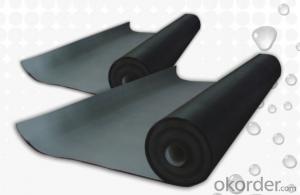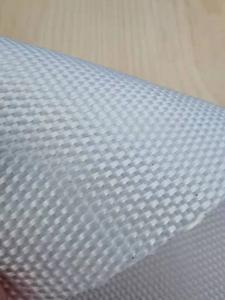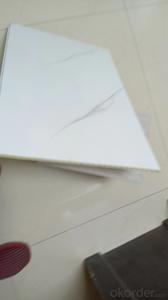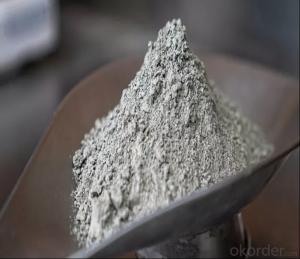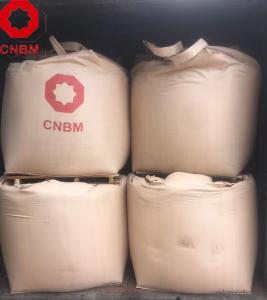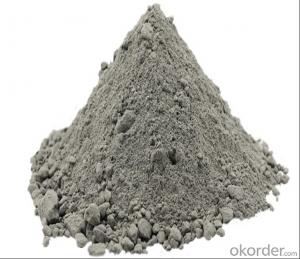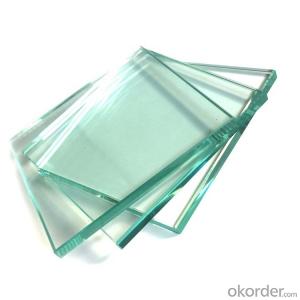EPDM Coiled Rubber Waterproof Membrane with 0.5mm Thickness
- Loading Port:
- Shanghai
- Payment Terms:
- TT OR LC
- Min Order Qty:
- 20000 m²
- Supply Capability:
- 5000000 m²/month
OKorder Service Pledge
OKorder Financial Service
You Might Also Like
EPDM Coiled Rubber Waterproof Membrane with 0.5mm Thickness
Description Of EPDM Coiled Rubber Waterproof Membrane with 0.5mm Thickness:
This waterproof coiled material is of high elasticity with best performance among high polumer
waterproof coiled material in the world.It is also the most typical one in the world.Waterproof coiled material made of ternary ethylene-propylene rubber is produced withthe use of the most advanced contiuous extrusion and vulcanization technology and related equipments which are specially designed for production of such product.It is good in compactness,without bubble and performance difference in length and breadth,perfomances reach or exceedthe demands of GB18173.1-2000 standard.
Main Features of EPDM Coiled Rubber Waterproof Membrane with 0.5mm Thickness:
A.Polyester based SBS Modified Bitumen Waterproofing Membrane
a. Strong impermeability
b. High tensile strength, elongation, ability to adapt the grassroots shrinkage deformation and cracking
c. Puncture-resistant, broken resistant, tear-resistant
d. The corrosion resistance, resistance to mildew, weathering good
e. Construction convenient, hot-melt can be operated Four Seasons Construction, reliable joints
B. Fiberglass based SBS Modified Bitumen Waterproofing Membrane
a. High tensile strength, stability of a good size
b. High Temperature good performance
c. Damage resistance, corrosion resistance, resistance to mildew, weathering good performance
d. Good construction performance, reliable joints.
Specifications of EPDM Coiled Rubber Waterproof Membrane with 0.5mm Thickness:
| Material | EPDM Rubber |
| Size | 1.2m (width)*20m (length) or customized, weldable type 2.05m or 4m width |
| Thick | 1.2mm, 1.5mm, 2.0mm |
| Type | Vulcanized & Weldable |
| Pattern | Non-reinforced (homogeneous) |
| Certificate | ISO9001/14001 |
Applications of EPDM Coiled Rubber Waterproof Membrane with 0.5mm Thickness:
1. Roofs, Basement, Toilet
2. Industrial and civil building waterproofing
3. Geo-synthetic liner for swimming pool, channels, irrigation system
4. Especially suit for projects with high requirements in durability, anti-corrosion and deformation
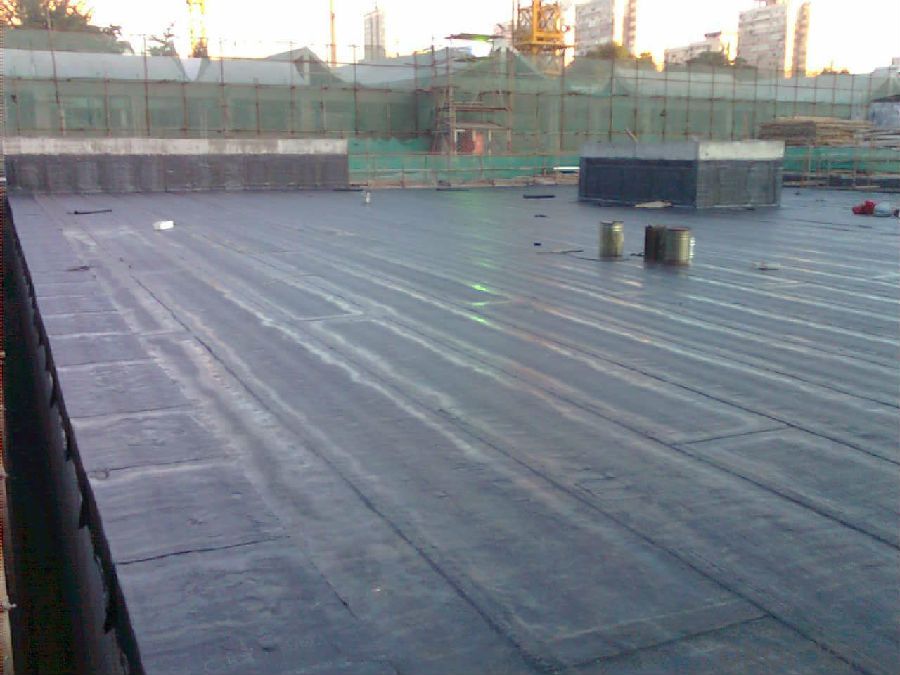
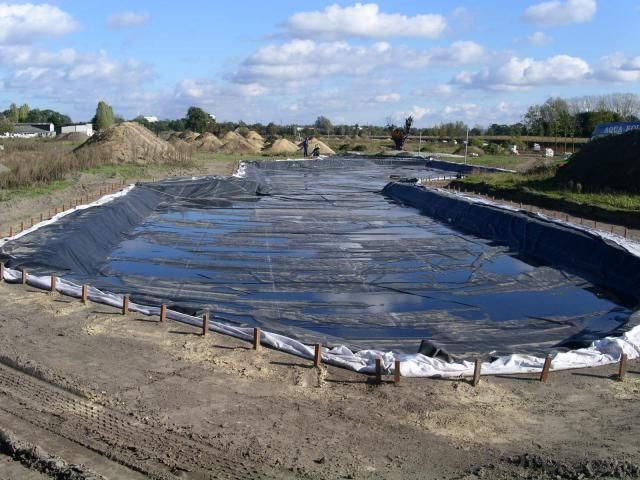
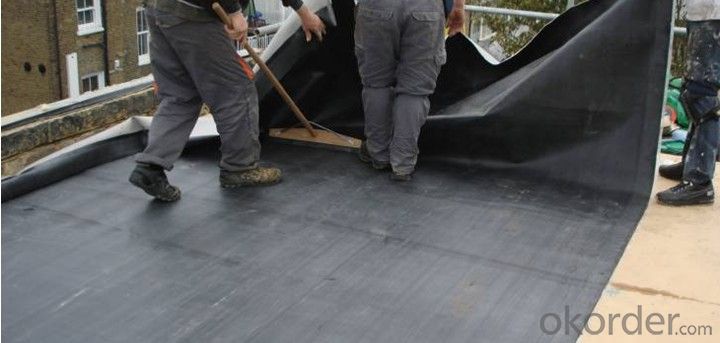
IMages of EPDM Coiled Rubber Waterproof Membrane with 0.5mm Thickness:
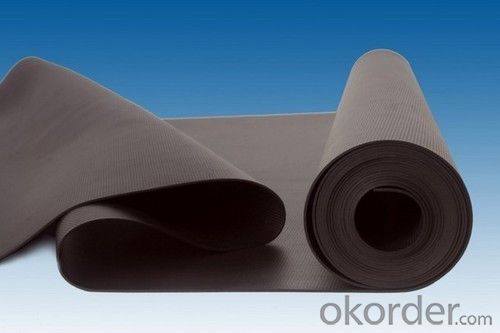
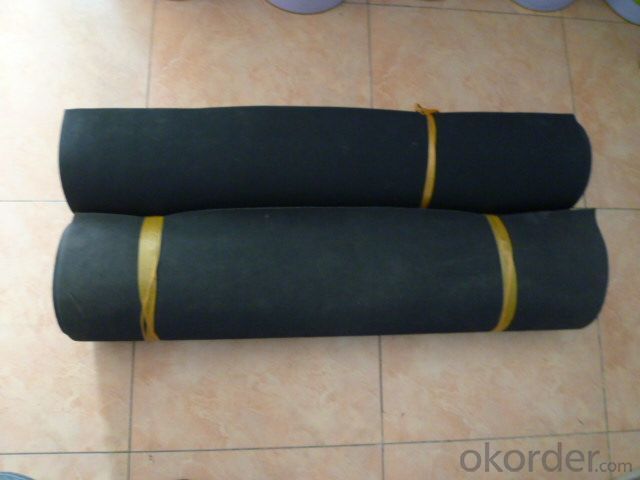
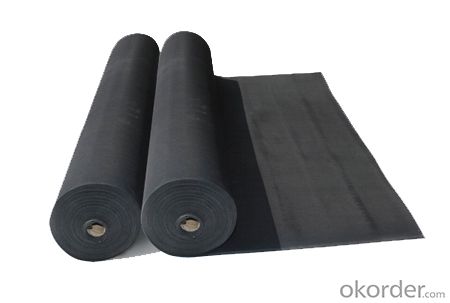
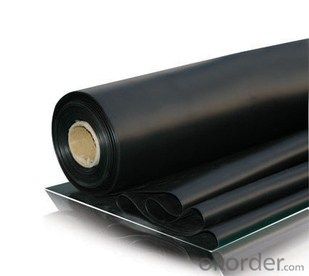
FAQ of EPDM Coiled Rubber Waterproof Membrane with 0.5mm Thickness:
1. What are we supplying?
We are specialized in producing Colorful Asphalt Roof Shingle, SBS/APP modified bitumen waterproof membrane, Self adhesive bitumen waterproof membrane, PVC waterproofing membrane, EPDM rubber roofing membrane, Single Component Polyurethane Waterproof Coating, and Spray Polyurea Waterproof Coating
.
2. How Many years experience do we have?
We have been exported to more than 20 countries in the past 15 years.
3. How long do we usually reply your request?
We always reply our customer within 24 hours.
- Q:Can waterproofing membranes be used on roofs with slopes?
- Yes, waterproofing membranes can be used on roofs with slopes. These membranes are designed to provide a protective barrier against water infiltration and are commonly used on roofs with varying degrees of slope to prevent leaks and water damage.
- Q:Can a waterproofing membrane be tested for quality or performance?
- Yes, a waterproofing membrane can be tested for quality and performance. Various tests can be conducted to evaluate its durability, water resistance, tensile strength, and other factors. These tests include water penetration tests, adhesion tests, elongation tests, and exposure tests to simulate real-life conditions. By subjecting the membrane to rigorous testing, its ability to withstand water intrusion and maintain its performance over time can be determined, ensuring its quality and effectiveness.
- Q:Are waterproofing membranes resistant to soil chemicals?
- Waterproofing membranes are commonly resistant to soil chemicals. These membranes are created to act as a barrier against water and moisture, and they are often manufactured using materials that can resist various chemicals found in soil. This resistance aids in safeguarding the membrane from deterioration or harm caused by exposure to soil chemicals. Moreover, waterproofing membranes are frequently subjected to testing and certification to ensure compliance with industry standards and regulations, including resistance to soil chemicals. Nevertheless, it is important to acknowledge that the degree of resistance may vary depending on the particular type and quality of the waterproofing membrane employed. Thus, it is crucial to select the appropriate membrane that is specifically designed to endure the soil conditions and chemicals present in the project area. Seeking advice from a professional or the manufacturer can offer further guidance on the most suitable waterproofing membrane for a specific application.
- Q:How does a waterproofing membrane handle expansion and contraction of the substrate?
- To effectively handle the expansion and contraction of the substrate, a waterproofing membrane is engineered to be flexible and elastic. It can stretch or shrink in accordance with temperature changes or other factors without experiencing any damage or failure. The flexibility of the membrane allows it to adapt to the movements of the underlying substrate, ensuring its integrity and complete functionality. This adaptability is achieved by utilizing materials with excellent elongation properties, such as modified bitumen, rubberized asphalt, or synthetic polymers like PVC or TPO. Moreover, a waterproofing membrane possesses a strong tensile strength, which enables it to withstand the stress caused by expansion and contraction without tearing or breaking. This strength is paramount in preventing water infiltration or moisture damage to the substrate. Additionally, during the installation of a waterproofing membrane, it is common practice to overlap or interlock the membrane sheets. These overlapping seams provide added protection against any potential substrate movement. If the substrate expands or contracts, the overlapping seams allow the membrane to accommodate the movement while maintaining a continuous and watertight barrier. In summary, a waterproofing membrane is specifically designed to effectively manage substrate expansion and contraction. Its flexibility, high tensile strength, and overlapping seams work together to ensure its durability, reliability, and efficacy in preventing water penetration, even as the substrate undergoes movement.
- Q:Can waterproofing membranes be used on loading docks?
- Yes, waterproofing membranes can be used on loading docks. Waterproofing membranes are commonly used in various construction projects to prevent water infiltration and protect the underlying structure. Since loading docks are exposed to rain, snow, and other weather conditions, applying a waterproofing membrane can help to keep the dock area dry and prevent water damage.
- Q:Can a waterproofing membrane be used on tunnels with architectural features?
- Indeed, tunnels with architectural features can benefit from the application of a waterproofing membrane. Such membranes possess versatility, enabling their usage on different structures, including tunnels with architectural elements. Their primary purpose is to establish a protective barrier against water infiltration, consequently safeguarding the structure against moisture-related harm. Regardless of the tunnel's unique architectural components, such as curves, arches, or decorative embellishments, a tailored waterproofing membrane can be tailored and implemented to ensure optimal water resistance. Therefore, it is imperative to seek guidance from a proficient waterproofing specialist experienced in working with tunnels and architectural features. They will assist in determining the most suitable membrane system for the specific project prerequisites.
- Q:Can a waterproofing membrane be used for a basement floor?
- Yes, a waterproofing membrane can be used for a basement floor.
- Q:Are waterproofing membranes resistant to chemical degradation?
- Yes, waterproofing membranes are generally resistant to chemical degradation. They are designed to withstand exposure to various chemicals, such as acids, alkalis, and solvents, without deteriorating or losing their effectiveness in preventing water penetration. However, the specific resistance to chemical degradation may vary depending on the type and quality of the membrane used.
- Q:Can a waterproofing membrane be used on balconies and decks?
- Yes, a waterproofing membrane can be used on balconies and decks. In fact, it is highly recommended to install a waterproofing membrane to protect these areas from water damage. Balconies and decks are exposed to rain, snow, and other weather elements, which can cause water to seep into the structure and lead to issues such as rotting, mold growth, and structural damage. A waterproofing membrane provides a protective barrier that prevents water from penetrating the surface and directs it away from the structure. It is typically applied underneath the surface material, such as tiles or decking, and acts as a waterproof layer. This helps to extend the lifespan of the balcony or deck, ensuring its durability and maintaining its aesthetic appeal. Additionally, using a waterproofing membrane can also prevent water from dripping down to the areas below, which is particularly important for balconies located above living spaces. Overall, using a waterproofing membrane is an effective solution to ensure the longevity and functionality of balconies and decks.
- Q:Are waterproofing membranes resistant to acid exposure?
- Yes, waterproofing membranes are generally resistant to acid exposure. They are designed to provide a barrier against water and other corrosive substances, including acids. However, the level of resistance may vary depending on the specific type and quality of the membrane used.
1. Manufacturer Overview |
|
|---|---|
| Location | |
| Year Established | |
| Annual Output Value | |
| Main Markets | |
| Company Certifications | |
2. Manufacturer Certificates |
|
|---|---|
| a) Certification Name | |
| Range | |
| Reference | |
| Validity Period | |
3. Manufacturer Capability |
|
|---|---|
| a)Trade Capacity | |
| Nearest Port | |
| Export Percentage | |
| No.of Employees in Trade Department | |
| Language Spoken: | |
| b)Factory Information | |
| Factory Size: | |
| No. of Production Lines | |
| Contract Manufacturing | |
| Product Price Range | |
Send your message to us
EPDM Coiled Rubber Waterproof Membrane with 0.5mm Thickness
- Loading Port:
- Shanghai
- Payment Terms:
- TT OR LC
- Min Order Qty:
- 20000 m²
- Supply Capability:
- 5000000 m²/month
OKorder Service Pledge
OKorder Financial Service
Similar products
New products
Hot products
Related keywords
